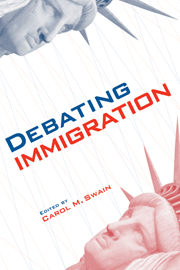Book contents
- Frontmatter
- Contents
- About the Contributors
- Preface
- Acknowledgments
- 1 Introduction
- PART I PHILOSOPHY AND RELIGION
- PART II LAW AND POLICY
- PART III ECONOMICS AND DEMOGRAPHICS
- 9 Borderline Madness
- 10 Immigrant Employment Gains and Native Losses, 2000–2004
- 11 Economics of Immigration and the Course of the Debate Since 1994
- 12 Immigration and Future Population Change in America
- PART IV RACE
- PART V COSMOPOLITANISM
- PART VI CONCLUSION
- Notes
- Index
11 - Economics of Immigration and the Course of the Debate Since 1994
Published online by Cambridge University Press: 05 June 2012
- Frontmatter
- Contents
- About the Contributors
- Preface
- Acknowledgments
- 1 Introduction
- PART I PHILOSOPHY AND RELIGION
- PART II LAW AND POLICY
- PART III ECONOMICS AND DEMOGRAPHICS
- 9 Borderline Madness
- 10 Immigrant Employment Gains and Native Losses, 2000–2004
- 11 Economics of Immigration and the Course of the Debate Since 1994
- 12 Immigration and Future Population Change in America
- PART IV RACE
- PART V COSMOPOLITANISM
- PART VI CONCLUSION
- Notes
- Index
Summary
It ain't what folks don't know that's the problem, it's what they know that ain't so.
Will RogersIn the early 1990s, I got interested in the economics of immigration, first for a massive cover story for National Review, which was then enjoying a last flurry of intellectual independence before regressing to the Beltway Right mean, and later for a book, Alien Nation: Common Sense About America's Immigration Disaster, which was published in 1995.
I researched the topic by what turned out to be the radical technique of actually reading the technical literature. This seemed normal to me as a financial journalist. But it was apparently shocking to political journalists and pundits (and politicians, although they, of course, are excused from not participating in such ivory tower debates). They actively resisted it – even (in fact, especially) those working for newspapers nominally concerned with business and economics, particularly the Wall Street Journal.
Indeed, to this day, the public debate about the economics of immigration simply does not reflect the professional consensus among labor economists, although this consensus has only strengthened over the last decade. In Will Rogers's words, the problem is not what folks don't know, it's what they know that ain't so.
This is an unusual situation. But it is not completely without parallel. Thus, professional economists in the United Kingdom were actually quite tempered about the benefits to be gained from Britain's entry into the European Union, although it was always publicly justified as an economic panacea.
- Type
- Chapter
- Information
- Debating Immigration , pp. 157 - 164Publisher: Cambridge University PressPrint publication year: 2007
- 7
- Cited by

